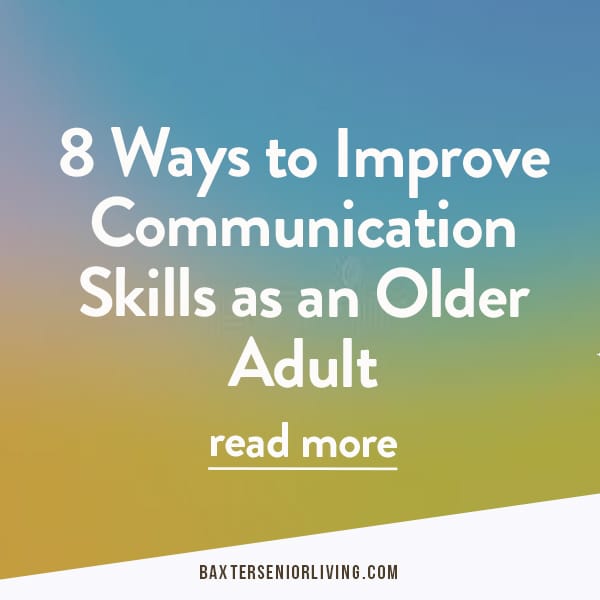Good conversation lifts mood like nothing else. But for older adults, there’s even more reason to get talking: it sharpens the mind, reduces the risk of depression and chronic illness, curbs pain, and may increase longevity, according to studies. For many seniors, though, being a good conversationalist doesn’t come easy. Some older adults never had the gift of gab, while others are hindered by limitations, like hearing loss and isolation. Still, it’s never too late to improve your communication skills. These eight strategies will help grow your confidence in conversing as an older adult so you can usher in healthier, happier, and more meaningful days.
Chitchat with Younger Generations
If you have the advantage of young people in your life, pay attention to them; they can teach you plenty about conversation. Their fresh insights and current-day expressions shed light on communicating in the modern world. Add to that your lifelong wisdom and experiences, and you have the makings for a rich and stimulating back-and-forth. Spend time chitchatting with younger family members and acquaintances, or consider volunteering at a school or other venue where you can engage with youths.
Keep Your Ears Open–and Hearing Aids In
Being a good listener is key to having a good conversation. If that means wearing your hearing aids more regularly, by all means do it. There’s nothing worse than not being able to hear others when they talk or ask questions and nodding like you understand when you really don’t. Of course, being a good listener also involves sharing the opportunity to speak. Often the best conversationalists are the ones who don’t dominate but rather tune in, absorb what’s being said, and offer relevant remarks at the appropriate time.
Get Social However You Can
You can’t be a good conversationalist without people, so make a point to gather with others often. The more you practice expressing and exchanging ideas, the better you get at it. Older adults reap significant benefits from social interaction, too, including improved memory, reduced stress and anxiety, and stronger heart and brain function. When you can’t be with people in person, reports Mayo Clinic, getting online is the next best thing. Find someone to help you learn about social media so you can enjoy good conversation in the comfort of home.
Don’t Stop Reading
Reading keeps you in the know on current events, pop culture, interesting history–you name it. More importantly, well-read people have much to talk about and contribute to any conversation. Reading also boosts decision-making skills and concentration in older adults, plus you increase your vocabulary and understanding of the meanings of words. Try to read a variety of material, from the latest bestsellers to newspapers to online content, and watch your adeptness at conversation flourish.
Use Body Language
Can’t speak as eloquently as you did when you were younger? Your body language can make up for it. Eye contact, a heartfelt smile, or a gentle touch on the arm can be a powerful means to communicate and connect with someone. On the other hand, slumped shoulders, a yawn, or looking around the room will have the opposite effect. If talking isn’t your thing, you can still say a lot with simple facial expressions and gestures, which may turn out to be more memorable than any words you have to offer.
Portray Your True Self When You Talk
People like conversation that’s genuine and honest, not haughty, deceptive, or stilted. Be yourself when you converse with others. They’ll appreciate your authenticity, and you’ll appreciate the freedom of speaking from the heart about your own unique experiences rather than trying to portray a different persona. And don’t worry about aging yourself with your word choices, ideas, and manner of speech. Conversation is more rewarding for all when a mix of personalities and perspectives is represented.
Be Open to Discussion Topics
Older adults tend to be set in their ways, but try opening your heart and mind to topics of conversation that may not be your favorites or that you know little about. You might be surprised at how intriguing certain subjects are when you ask questions, show interest, and gain knowledge. Naturally, you’ll want to steer clear of topics that might offend or cause discomfort or hurtful feelings to your fellow talkers. Often, what you choose to discuss can impact a conversation almost as much as the conversation itself.
Infuse Laughter into the Conversation
A good belly laugh is infectious and sets the tone for fun and fulfilling conversation. Offer a lighthearted anecdote, tell a joke, show your wit, or poke fun at yourself. Laughter isn’t just a great way to bring people together; it increases confidence while reducing any tension or awkwardness that can impede a fruitful discussion. Another good reason to laugh? It provides a healthy workout for the cardiovascular, pulmonary, and respiratory systems, says the American Lung Association.
Don’t let uncertainty or aging limitations keep you enjoying good conversation as an older adult. Take the steps to boost your gab skills and see what a difference it can make to your health, happiness, and quality of life.


